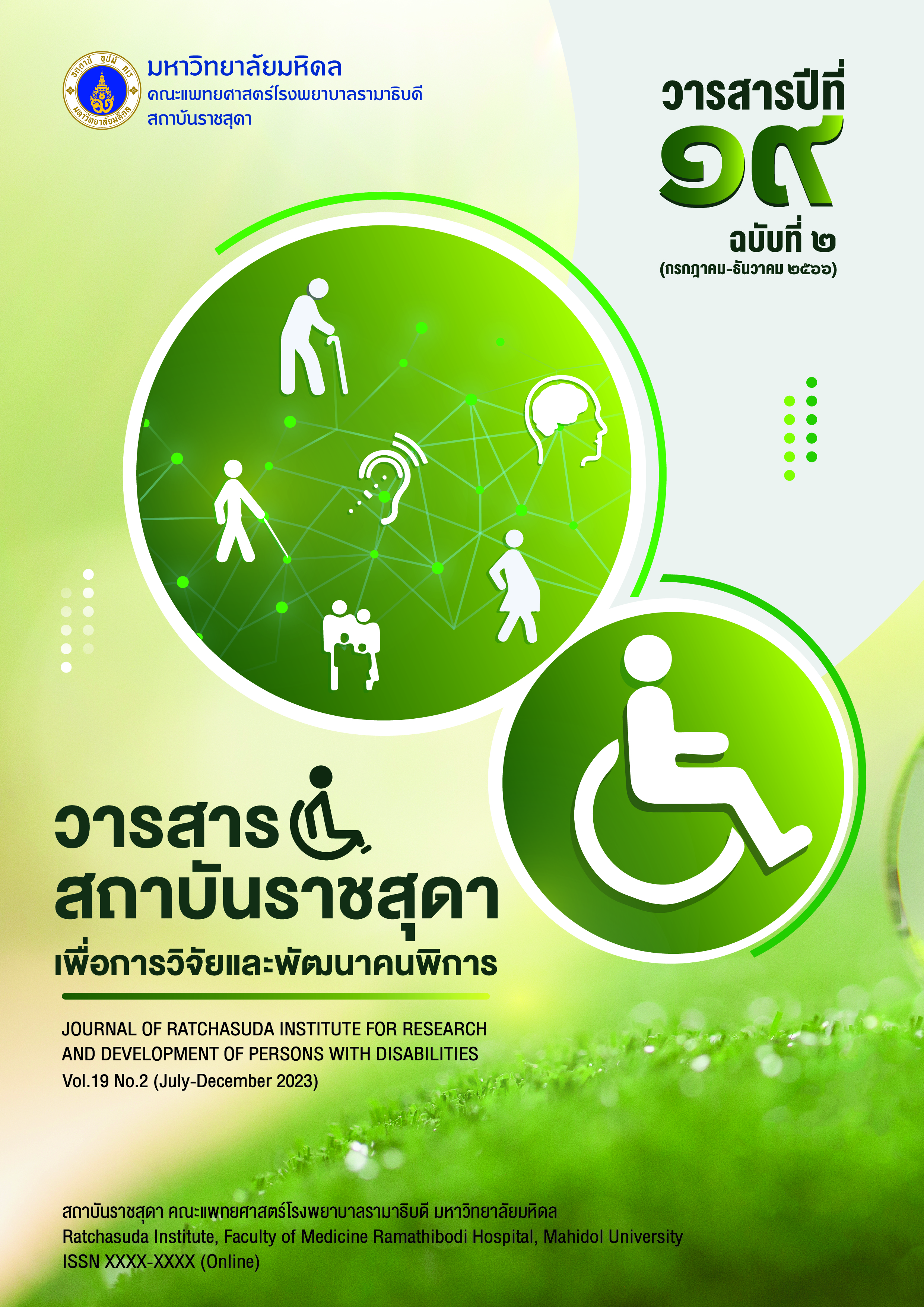The Development of Learning Achievement and Growth Mindset of Primary School Students with Learning Disabilities in Mathematics Using Brain-Based Learning Together with Principles for Developing the Growth Mindset
Keywords:
Brain-Based Learning Together with Principles for Developing the Growth Mindset, Principles for Develop the Growth Mindset, Growth Mindset, Mathematics AchievementAbstract
The primary school students with learning disabilities in mathematics have low learning achievement require the Brain-Based learning together with the principles of developing the growth mindset in order to create a mindset that do not surrender to obstacles and overcomes failures to succeed in mathematics learning. Consequently, this study methodizes learning according to the brain's potential and Brain-Based learning together with the principles of developing the growth mindset to develop students. The purpose of this study were to 1) study of guidelines for developing academic achievement and the growth mindset of primary school students with learning disabilities in mathematics using Brain-Based learning together with the principles of developing the growth mindset, 2) study the results of developing mathematics achievement, and 3) study the results of developing the growth mindset of primary school students with learning disabilities in mathematics. The participants were 4th grade students with learning disabilities in mathematics. The sample in this study were 5 primary school students. The research methodology used a classroom action research model. The tools used in the research were 12 learning management plans for Brain-Based learning together with the principles of developing the growth mindset, reflective learning journals, achievement tests, exercises, essence notebook, and assessment form growth mindset. Analyze data using content analytics and examine triangular method. The results revealed that 1. Guidelines for developing academic achievement and the growth mindset of primary school students with learning disabilities in mathematics. By Brain-Based learning according to the potential of the brain together with the principle of developing a framework for growth mindset consists of 5 stages as follows: Step 1 Prepare the brain, develop the mindset, Step 2 Develop the brain through concrete experiences, Step 3 Learn the material, Step 4 Practice, develop abilities and Step 5 Apply mathematical knowledge in the new situations 2. Primary school students with learning disabilities in mathematics. Has been a significant improvement in mathematics achievement. 3. Primary school students with learning disabilities in mathematics has been is a progressive development of the growth mindset. And after organizing all learning activities in the operating circuits. The students have the growth mindset.
Downloads
References
Anderman, E.M., Eccles, J.S., Yoon, K.S., Roeser, R., Wigfield, A. & Blumenfeld, P. (2001). Learning to value mathematics and reading: Relations to mastery and performance-oriented instructional practices. Contemporary Educational Psychology, 26(1), 76-95. https://doi.org/10.1006/ceps.1999.1043
Arayawinyu, P. (2006). Research to develop innovations for children with learning disabilities in mathematics. Wankaew.
Boaler, J. (2016). Mathematical mindsets: Unleashing students' potential through creative math, inspiring messages and innovative teaching. Jossey-Bass.
Changwadsuk, O. (2011). The development of learning achievement in mathematics on variation word problems of first - year low achievers in vocational certificate program through remedial mathematics activity packages [Master’s thesis, Srinakharinwirot University]. Srinakharinwirot University Institutional Repository (SWU IR). https://ir.swu.ac.th/jspui/handle/123456789/757
Dweck, C.S. (2006). Mindset: The new psychology of success. Random House.
Dweck, C.S. (2012). Mindset: How you can fulfill your potential. Constable and Robinson.
ElAdl, A. M. (2020). Effectiveness of a Brain-Based learning theory in developing mathematical skills and scientific thinking among students with learning disabilities in Oman. Psycho-Educational Research Reviews, 9(2), 67-74.
Jansrisukot, J. (2017). Learning management for children with learning disabilities. Education, Udon Thani Rajabhat University.
Kaemanee, T. (2020). The art of teaching: Knowledge for the effective teaching and learning. Chulalongkorn University.
Kolb, A.Y. & Kolb, D.A. (2009). The learning way: Meta-cognitive aspects of experiential learning. Simulation & Gaming, 40(3), 297-327. https://doi.org/10.1177/1046878108325713
Kolb, D. A. (1984). Experiential learning: Experience as the source of learning and development. Pretice-Hall.
Morgenroth, T., Ryan, M. K., & Peters, K. (2015). The motivational theory of role modeling: How role models influence role aspirants’ goals. Review of General Psychology, 19(4), 465-483. https://doi.org/10.1037/gpr0000059
Paunesku, D. (2013). Scaled-up social psychology: Intervening wisely and broadly in education. [Doctoral dissertation, Stanford university]. Stanford. https://web.stanford.edu/~paunesku/paunesku_2013.pdf
Rangsan, S. (2018). Development of an educational intervention prototype to enhance growth mindset and numeracy skills for elementary students who are at risk of mathematics. [Doctoral dissertation, Chulalongkorn University]. Chulalongkorn University Intellectual Repository (CUIR). http://cuir.car.chula.ac.th/bitstream/123456789/73263/1/Edu_6083359727_San%20Ra.pdf
Royal Institute. (2012). Education dictionary Royal Institute edition. Aroonprinting.
Sarkhan, N. (2022). Teaching the children with learning disabilities. Journal of Roi Kaensarn Academi, 7(2), 413.
Sriram, R. (2013). Rethinking intelligence: The role of mindset in promoting success for academically high-risk students. Journal of College Student Retention: Research, Theory & Practice, 15(4), 515-536. https://doi.org/10.2190/CS.15.4.c
Thamrongsottisakul, S. (2017). The development of reading instructional model based on the concepts of brain-based learning and multisensory for students with reading disabilities in primary school. Special needs student potential development center of Tha-it school, Uttaradit, Thailand.
Wongchotikul, S., Chaturanon, W. & Bumrerraj, S. (2017). The development of mathematics teaching model on the Brain-Based learning for elementary students. Journal of Graduate School Sakon Nakhon Rajabhat University, 14(65), 193-198.
Downloads
Published
How to Cite
Issue
Section
License
Copyright (c) 2023 Journal Of Ratchasuda Institute for Research and Development of Persons With Disabilities

This work is licensed under a Creative Commons Attribution-NonCommercial-NoDerivatives 4.0 International License.
บทความที่ได้รับการตีพิมพ์เป็นลิขสิทธิ์ของวารสารสถาบันราชสุดาเพื่อการวิจัยและพัฒนาคนพิการ






